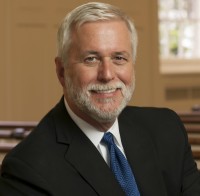Stubborn hope

I was leading a meeting of the vice presidents of our seminary, but I could think about only one thing—my teenagers. My wife and I had been up late the previous night having the “these are our values” talk with one of them. Again.
We have two fabulous sons who are doing well at navigating their way through adolescence. The talk the night before was not because our son had done something wrong, but because he was overwhelmed by the messages of his teenage culture that conflict with those of our family and church. This tears at his soul.
There were always good kids and dangerous kids in high school. Drugs and booze have been around forever. The back seats of cars have long been used for things other than carrying passengers. And this isn’t the first generation to feel pressure about getting into a good college. I get all of that. It has always been hard to be a teenager, but today there are new threats. Here are just a few of them.
Read our latest issue or browse back issues.
Previous generations of students didn’t worry about being indiscriminately shot during a killing spree or running into a terrorist explosion during a marathon. We are now way beyond fretting over getting beaten up by the school bully.
When today’s teenagers are “alone” they can constantly text their friends, post on Facebook, surf the net, watch videos, or listen to music—all from their phones. They are no longer left with periods of quiet where all they can do is read, ponder, brood, imagine, or pray. I worry about these distractions to the holy “still small voice” that calls to young lives.
When birthdays and Christmas celebrations come around, my wife and I struggle to find presents for our kids because they already have everything they want. Frankly, so do we. What happens to the soul that doesn’t know how to live with desire, hope, saving, and waiting? Other teenagers in our society do not have everything they need, never mind want. My children see that and have no idea how to fix this problem.
The schools of law, medicine, business, and divinity are all struggling to find jobs for their graduates. But the cost of attending these schools, on top of an undergraduate education that costs up to $60,000 a year, will saddle these graduates with crippling student loans. There’s lots of debt but a dearth of jobs. It’s a story that’s told over and over, and every kid going off to college knows it. This next generation doesn’t go to school thinking that it will secure a better future for them.
We didn’t used to think that the fashion models in catalogs should look as if they’re overwhelmed with despair. But today being sad is so cool it can sell.
Today’s teenagers have never seen a federal government that does more than engage in political stalemates. They have no Kennedy who can inspire them to ask what they can do for the country, no King who can make them want to march in the streets for a dream. Instead they have grown up in a post-9/11 culture that has done everything it can to make them afraid.
And they know that we have done more damage to the environment than can ever be repaired.
What fascinates me is how many teenagers refuse to buy the marketed temptations to despair and fear. They go to work camps, volunteer at homeless shelters, plan careers in social work, and study Arabic in the hopes of listening to someone who is different.
Some of them will finish college and come to seminary. I am impressed by our students’ missional commitments. When they applied for admission, none of them were confused by the lack of jobs in ministry; they remind me that they’ve heard only bleak forecasts for their future since they were teenagers. So they don’t think about getting into a good career. If they can’t find work in a church, they’ll start a church or work for a nonprofit. They’ll find a way.
This next generation has little interest in our debates about sexuality and church property, and they demonstrate an extraordinary comfort with difference. Since they’ve never known the metanarrative that idolized June and Ward Cleaver, they seem to live easily with a society filled with many narratives coming from people of different colors, religions, and orientations. They don’t trust anything big or meta, but they believe strongly in the small and winsome communities they create for themselves.
This refusal to despair is seen not only in those who hang out in church youth groups or who are looking for a service project to put on their college applications. A quiet hope abounds in this generation. It seems to me that its members are saying, “We get it that our future is filled with obstacles, but we’re just going to keep moving.” And that has always been the best response any generation could ever make to the mess that an earlier generation placed in their hands.






